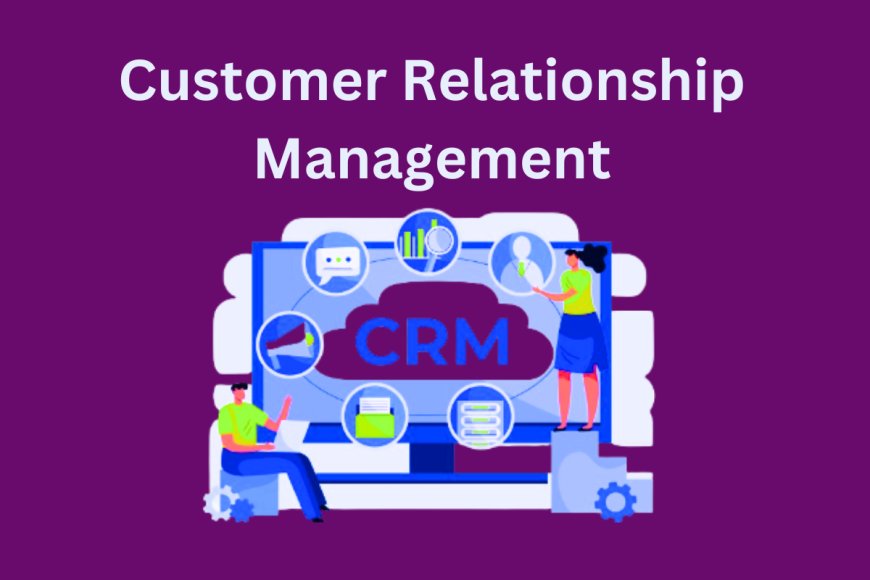Customer Relationship Management: Nurturing Business Connections
Customer Relationship Management

In the fast-paced world of business, the ability to cultivate and maintain strong relationships with customers is not just advantageous—it's essential. This is where Customer Relationship Management (CRM) takes center stage, serving as a pivotal strategy for businesses aiming to foster lasting connections with their clientele.
Introduction
Brief Explanation of Customer Relationship Management (CRM)
Customer Relationship Management, commonly known as CRM, is a comprehensive strategy designed to manage and nurture relationships with customers. It involves the strategic use of technology to organize, automate, and synchronize sales, marketing, customer service, and technical support.
Importance of CRM in Business Blogs
In the context of business blogging, understanding and implementing CRM strategies can significantly enhance the effectiveness of your content. By tailoring blogs to the specific needs and preferences of your audience, businesses can foster engagement and loyalty.
Understanding CRM
Definition and Core Concepts
At its core, CRM involves gathering and analyzing customer data to improve interactions, drive sales, and boost customer retention. It encompasses a range of technologies and techniques designed to manage and analyze customer interactions throughout the customer lifecycle.
Evolution of CRM in Business Practices
The evolution of CRM has been remarkable, transitioning from manual methods to sophisticated software solutions. Today, businesses can choose from various CRM systems, each offering unique features and capabilities.
Types of CRM Systems
Different types of CRM systems cater to diverse business needs. These include operational CRM, analytical CRM, and collaborative CRM, each serving specific functions in optimizing customer relationships.
Benefits of Implementing CRM
Improved Customer Satisfaction
CRM enables businesses to understand their customers better, anticipate their needs, and provide personalized experiences. This, in turn, leads to improved customer satisfaction and loyalty.
Enhanced Customer Retention
By maintaining a centralized database of customer interactions and preferences, businesses can proactively address issues, offer targeted promotions, and ultimately enhance customer retention rates.
Streamlined Communication
CRM facilitates seamless communication within the organization. Teams can access a unified view of customer information, ensuring consistent messaging and a more cohesive approach to customer interactions.
Implementing CRM in Your Business
Choosing the Right CRM Software
Selecting the appropriate CRM software is crucial. Consider factors such as scalability, integration capabilities, and user-friendliness to ensure a seamless adoption process.
Customizing CRM for Your Business Needs
Tailor the CRM system to align with the specific requirements of your business. This may involve customizing fields, workflows, and reports to maximize its effectiveness.
Training Your Team on CRM Usage
A successful CRM implementation requires a well-trained team. Provide comprehensive training to ensure that all users can navigate the system proficiently.
Overcoming CRM Challenges
Common Challenges Businesses Face with CRM
While CRM offers numerous benefits, businesses often encounter challenges during implementation. These may include data migration issues, resistance from employees, or integration complexities.
Strategies to Overcome CRM Implementation Challenges
Proactive planning, open communication, and ongoing support are key in overcoming CRM challenges. Addressing concerns early on and providing continuous training can mitigate potential obstacles.
Real-life Success Stories
Case Studies Highlighting Businesses That Successfully Implemented CRM
Examining real-life success stories provides valuable insights. Explore case studies of businesses that effectively utilized CRM to improve customer relationships, streamline processes, and drive growth.
The Impact of CRM on Their Customer Relationships
Understand the tangible impact CRM had on these businesses, from increased customer satisfaction to measurable improvements in revenue and market share.
Future Trends in CRM
Emerging Technologies in CRM
Stay ahead of the curve by exploring emerging technologies in CRM. From artificial intelligence to machine learning, these innovations are shaping the future of customer relationship management.
The Role of AI and Machine Learning in Shaping CRM
Artificial intelligence and machine learning algorithms are increasingly being integrated into CRM systems, offering predictive analytics and automating routine tasks to enhance efficiency.
Integrating CRM with Marketing Strategies
Aligning CRM with Digital Marketing Efforts
Discover how integrating CRM with digital marketing strategies can amplify the effectiveness of your campaigns. Targeted marketing based on customer insights can significantly improve conversion rates.
Leveraging CRM Data for Targeted Marketing Campaigns
Harness the power of CRM data to create personalized and targeted marketing campaigns. Tailoring your messages to specific customer segments increases the relevance of your marketing efforts.
Measuring CRM Success
Key Performance Indicators (KPIs) for CRM
Identify and track key performance indicators to measure the success of your CRM implementation. Metrics such as customer acquisition cost, customer lifetime value, and customer satisfaction scores offer valuable insights.
Assessing the Impact of CRM on Business Growth
Evaluate the impact of CRM on overall business growth. Analyze data over time to determine the correlation between CRM initiatives and increased revenue, market share, and customer loyalty.
Common Myths about CRM
Dispelling Misconceptions Surrounding CRM
Separate fact from fiction by addressing common myths about CRM. This section aims to clarify misunderstandings and emphasize the tangible benefits that CRM can bring to businesses.
Clarifying the True Value of CRM for Businesses
Reiterate the true value of CRM in enhancing customer relationships, improving operational efficiency, and contributing to long-term business success.
Tips for Small Businesses
How Small Businesses Can Implement CRM Effectively
Even with limited resources, small businesses can benefit from CRM. Explore cost-effective solutions and strategies tailored to the unique needs and constraints of smaller enterprises.
Cost-Effective CRM Solutions for Startups
Highlight budget-friendly CRM solutions suitable for startups. Discuss the features and functionalities that make these options ideal for businesses with limited financial resources.
Customer Testimonials
Gathering Feedback from Businesses That Successfully Implemented CRM
Direct feedback from businesses that have experienced success with CRM adds authenticity to your content. Share testimonials that showcase the positive impact CRM had on their operations.
Insights into the Customer Perspective on CRM Usage
Include insights from customers who have interacted with businesses utilizing CRM. Understanding the customer perspective provides a holistic view of the benefits and challenges associated with CRM implementation.
In conclusion, integrating a robust Customer Relationship Management system is not just a trend but a strategic necessity for businesses of all sizes. By adopting CRM practices, businesses can forge stronger connections with their customers, streamline operations, and position themselves for sustained success in an ever-evolving market.
What's Your Reaction?




























































































